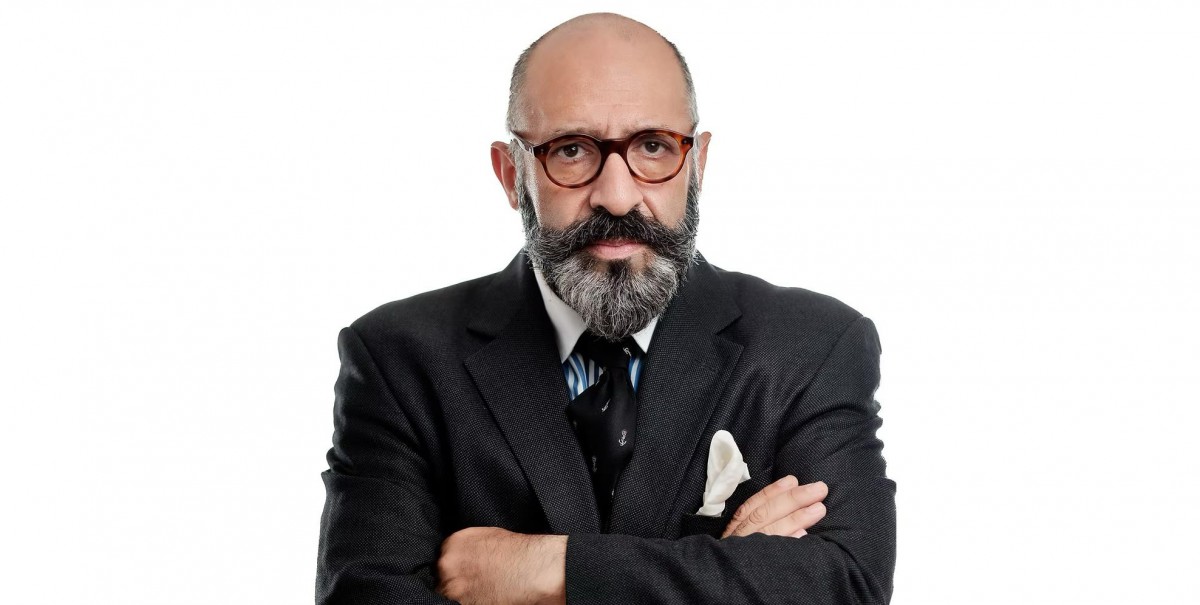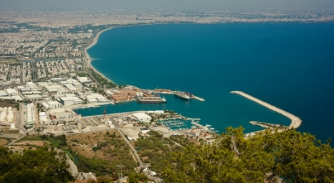Having the last word
On his return to superyacht law, John Leonida explores the market’s challenges and the hard truths yachting must embrace to find its place in the modern world…

After a four-year hiatus, John Leonida has returned to the fold, joining Wordley, having previously served as a Partner at Clyde & Co for two decades. As one of the most familiar faces in superyacht law, Leonida’s return signals the inauguration of a dedicated superyacht team at his new firm, having implemented a similar practice during his previous tenure that saw Clyde & Co become one of the first yachting law practices in the UK.
During what he has dubbed his “sabbatical”, you might be forgiven for thinking Leonida took some time to put his feet up. In truth, he has been incredibly busy researching his PhD thesis, which details the cultural history of superyachts, amongst many other ventures. Leonida has spent a lifetime obsessed with boats and it is this passion that has brought him back. He was neither forced nor compelled; it was the love of the industry, the people and, most importantly, the yachts that drew him back.
Speaking with SuperyachtNews, the new Counsel to Wordley discusses his time away, what has changed in the meantime and his concerns about the current state of the market.
“What excites me about what we are doing at Wordley is that it takes me back to those early days at Clyde & Co when we were doing something new. In 1998, the idea of superyacht law didn’t really exist,” he explains. “Back then, the market was exploding and it was exciting. Now are exciting times too, but we have new challenges. Ultimately, we’re wondering ‘Where do superyachts fit in the world in 2024?”
Since rejoining the market, Leonida has asked himself whether people are now more focused on what a superyacht actually is and what it needs to deliver. Are clients more open to being relaxed about certain aspects, or have expectations shifted over time? What exactly are the current expectations around yachts, and crucially, are those expectations sufficiently met by the contractual frameworks they sign up to?
During an economic downturn, disputes in the yachting and every other sector inevitably spike. Leonida points out that this trend is predictable, as during the prosperous years from 2001 to 2008 when the market was thriving, there were still plenty of issues, but with wealth in abundance, clients often let matters slide. However, when financial pressure builds, tolerance vanishes and people become more inclined to dig their heels in. It’s a fundamental reality in the sector’s economic and legal terms.
These are the economic circumstances we currently find ourselves in. In fact, since joining Wordley, every case he has received so far has focused on disputes involving new builds and refits, so the challenges are not confined to one segment of the market and a recurring theme is the disconnect between what clients believe is promised and what has actually been delivered.
Part of that problem lies with contracts. Sometimes, these agreements aren’t as watertight as they should be, and this is where interpretation plays a significant role, often leading to bizarre disagreements. Compounding this issue is the mistaken belief that contracts are somehow standardised. As a result, there is usually a rush to get them signed, with shortcuts taken and proper due diligence sacrificed, all too often driven by desperation to move the deal forward quickly.
“People have this perception that contracts are standard, but that’s one of the biggest misconceptions,” says Leonida. “One of my oldest adages is, ‘Show me the standard client, and I’ll show you the standard contract.’ What often happens is that people try to shortcut the process just to get to a signature without realising the complexity involved.
“It’s like looking at a late Picasso in an art gallery, just a few lines on a canvas,” he continues. “Some might think, ‘Anyone can do that’, but they can’t. Because the brilliance lies not in what’s added but in what’s left out. And it’s the same with contracts. You cannot take an agreement drafted for specific circumstances, put it in a cardboard box, and send it off to a yard worldwide. It just doesn’t work that way. That contract worked because it was tailored for a particular owner in a specific yard. The economics of every yard are different and so are the demands of every owner.”
There is also a reoccurring rush to get construction underway, and lawyers are being left out of crucial negotiations to save time, a situation lawyers in the sector are all too aware of. But for every pound or euro not spent on proper legal work upfront, clients will spend ten, twenty, even fifty times that on lawyers if things go wrong. Leonida recounts cases where legal fees for disputes have exceeded £10 million and even more minor disputes that quickly racked up costs of half a million.
“It reminds me of the Picasso story I often tell,” he adds. “Picasso is asked to do a sketch, and he does it in seconds, then charges a large sum. The buyer says, ‘That only took you a few seconds’, and Picasso replies, ‘It took me 50 years and a few seconds’. When clients ask why I charge what I do, it’s the same principle. They’re not paying for the 30 minutes it takes to solve their issue; they’re paying for the decades of experience that made it possible.”
The lack of contact during these processes tends to frustrate someone with such immense experience. Many of us who are newer to the industry might believe that we are in an ever-changing industry with processes that feel newer and more refined as time passes. In some ways, this might be true. However, Leonida says many of the mistakes today echo those made decades, even centuries ago.
“Nothing we do is remarkably new,” he says, referencing a 1950 book he keeps close at hand, Sixty Years of Yachts by Herbert E. Julian, which chronicles the early days of yacht brokerage. The book shows the same pitfalls still seen in modern yachting. “Superyachts have been around forever and our problems aren’t unique to our time. Everyone thinks it’s the first time these issues are happening, but it simply isn’t true,” says Leonida. “In a meeting with clients earlier today, the issues they were talking about I’ve experienced many, many times before. That’s where having a man like me with a grey beard comes in. You bring that ‘been there, done that’ perspective.”
Leonida’s return to yachting brings a rare concoction of genuine passion, legal acumen, historical perspective and critical reflection to a market at a crossroads. As he continues to guide clients with decades of experience, his new approach looks to challenge misconceptions and acts as a wake-up call. Because whilst some things have remained the same, others have most definitely changed, at least externally.
One of the most notable differences upon his return is sensing a nervousness in the industry that wasn’t there before, one that stems from whether people like us or not. People are less willing to admit they work in this space, especially outside the yachting ecosystem. When Leonida mentioned the industry he used to work in during his time away, the vitriol heaped upon superyachts was shocking.
“This perception has intensified in recent years, particularly during the imposition of sanctions on Russians. Even when the issue has nothing to do with superyachts, people will seize it if there’s an opportunity to link them. The scapegoating of superyachts during events like the invasion of Ukraine is part of a wider phenomenon,” adds Leonida.
“However, there are other roots and reasons for public disdain. We need to accept that the idea people should like us because of the money we spend, the so-called trickle-down effect, is flawed. As an economist, I can tell you there are countless papers disproving trickle-down economics. It’s a simplistic theory that doesn’t hold up under scrutiny.”
There needs to be a deeper reflection on the origins of wealth in the industry. Trickle-down economics isn’t linear. When the wealth behind a yacht is accumulated through questionable means, whether through misappropriation of funds or clever tax planning, it can deprive home jurisdictions of vital tax income, often at the expense of less developed parts of the world. This creates a narrative that undermines the industry’s legitimacy and fuels criticism.
For the superyacht law expert, the issue links to the public scrutiny faced by institutions with historical ties to the slave trade. While not directly comparable, the idea that just as institutions are now being held accountable for the origins of their funding, the superyacht industry is not immune to similar ethical questions about the sources of its wealth resonates. We must acknowledge these hard truths to find where yachting belongs in 2024.
Leonida’s perspective compels the industry to grapple with its image and its place in a world that has become incredibly scrutinous, particularly towards us. For those who hire him now, he’s more than a lawyer. He’s a writer, an economist, a historian and someone unafraid to ask the difficult questions.
Having recently written a paper with RINA on public attitudes towards yachts, Leonida doesn’t shy away from the idea that his views might unsettle some. “But I’m not back to bang the drum for superyachting,” he asserts. “I’m here to challenge us all. To confront the truths we’d rather avoid, hold up a mirror to the industry and tell it how it is.”
NEW: Sign up for SuperyachtNewsweek!
Get the latest weekly news, in-depth reports, intelligence, and strategic insights, delivered directly from The Superyacht Group's editors and market analysts.
Stay at the forefront of the superyacht industry with SuperyachtNewsweek
Click here to become part of The Superyacht Group community, and join us in our mission to make this industry accessible to all, and prosperous for the long-term. We are offering access to the superyacht industry’s most comprehensive and longstanding archive of business-critical information, as well as a comprehensive, real-time superyacht fleet database, for just £10 per month, because we are One Industry with One Mission. Sign up here.
Related news

How ESG is driving Turkish marinas
Kemal Altuğ Özgün and the CBC Law team discuss how ESG principles are driving sustainability and financial success for marinas
Crew

EU Court rejects plea for Meridian A
The 85-metre Lürssen will remain in the hands of Spanish authorities due to suspected ties to the Russian CEO of Rostec, Sergei Chemezov
Fleet
.jpg)
Navigating shipyard insolvency during superyacht builds
Wikborg Rein's Linda Roxburgh discusses safeguarding superyacht owners' interests if their shipyard faces financial instability mid-build
Owner

Nuclear-powered yachts: a viable option towards achieving net-zero emissions?
Imagine a very large yacht capable of cruising the world non-stop without refuelling or requiring an expensive chase boat. Could this become a reality?
Crew

Charter guest denies wrongdoing
A businessman who chartered Persefoni I has denied any involvement in an incident that allegedly caused a severe wildfire in Greece
Crew

Crew arrested on arson charges in Greece
A superyacht crew will appear in a Greek court on arson charges after allegedly causing a wildfire on the island of Hydra
Fleet
Related news
How ESG is driving Turkish marinas
5 months ago
EU Court rejects plea for Meridian A
7 months ago
Charter guest denies wrongdoing
10 months ago
Crew arrested on arson charges in Greece
10 months ago
NEW: Sign up for
SuperyachtNewsweek!
Get the latest weekly news, in-depth reports, intelligence, and strategic insights, delivered directly from The Superyacht Group's editors and market analysts.
Stay at the forefront of the superyacht industry with SuperyachtNewsweek



